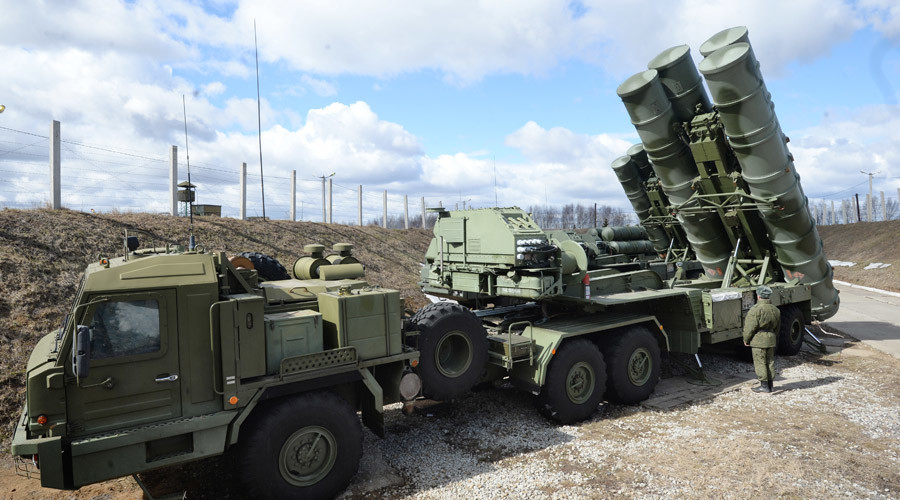NATO Summit Fails to Resolve Dissonance Over Turkey’s S-400 Purchase
Turkey’s insistence to acquire the Russian S-400 air defense missile system remains a source of friction for Ankara’s relationship with NATO despite assurances issued by Turkish leaders at a NATO summit in Brussels last week.
The trans-Atlantic alliance weathered a display of discord when U.S. President Donald J. Trump railed against Germany during the summit over defense spending and energy cooperation with Russia. But, the Turkish purchase of the Russian system also emerged as a flashpoint between Ankara and its NATO allies.
Days after the summit, a U.S. general said the acquisition of the S-400 system would provide valuable insight about the F-35 fighter jets to foes of NATO.
“Anything that an S-400 can do that affords it the ability to better understand a capability like the F-35 is certainly not to the advantage of the coalition,” Gen. Told Wolters, a U.S. Air Force general who is in Europe as the NATO Allied Air Commander, told Reuters on Sunday.
His remarks reflect a deeply rooted concern among NATO allies.
David Deptula, a retired U.S. Air Force general, was blunter. “The Turks have to make a choice. They’re either going to be part of NATO or they’re going to move into the Russian camp in terms of defense,” he said.
Turkish Foreign Minister Mevlut Cavusoglu defended the purchase at a panel conference before the summit last week. He placed the blame on the U.S. and other Western allies for failing to meet Turkey’s longstanding demands for air defense system, leaving no other choice for Ankara to press ahead with a plan to acquire such a system from Russia in favorable terms.
The bulk of the concerns prevalent among NATO and the U.S. commanders emanates from operating S-400s in close proximity to the F-35s in the Turkish territory. The use of the advanced fighter jet close the Russian system would enable Russians to obtain key information about the “range of detection and other characteristics of the aircraft,” Reuters pointed out in its analysis. All these factors would seriously undercut cutting-edge superiorities of the aircraft and would remove the element of surprise.
“There is continued anxiety of the role that Turkey can play in NATO, where the remainder European allies are concerned about a Russia that seeks to revise the post-Cold War settlement, Turkey appears to be separate from the security concerns of the remainder of NATO,” said David J. Galbreath, Professor of International Security at the University of Bath.
He noted that probably for the right reasons as it has a distinct role to play in the region as the Saudi/Iran conflict continues to unfold.
The role that Turkey might play has less to do with NATO and Russia’s role in the Middle East can be seen differently than Moscow’s position towards Eastern Europe and Ukraine, as a NATO ally, he told Globe Post Turkey. “In other words, I think that we are seeing a point by which the role of Turkey in NATO becomes unfit for both Turkey and NATO.”
“As this would happen slowly,” he added, “the U.S. congressional responses would only help add to this realization.”
In an article for Bloomberg, Eli Lake argued that it was Turkey’s drift to Russia, not Trump, emerged as the most daunting challenge for the unity and cohesion within NATO. President Recep Tayyip Erdogan and his Russian counterpart Vladimir Putin forged a strong bond of friendship in a dizzying set of twists and turns in bilateral ties that once wavered on the brink of an open confrontation after Turkey’s downing of a Russian warplane near its border in late 2015.
Both countries, along with Iran, took the lead to steer the diplomatic efforts in Syria to resolve the yearslong conflict.
“The emphasis of this NATO summit should be as much on Turkey’s misbehavior as on members’ defense spending,” Gary Schmitt of Amerian Enterprise Institute told Bloomberg before the start of the summit.
But while the summit witnessed a commitment and renewed focus on the need to increase defense budgets across the alliance members, the S-400 story did not garner as much attention as Trump’s fusillades against Germany.
During his address to the audience at the same panel, the Turkish foreign minister played down concerns over Turkey’s drift to Russia and reaffirmed Ankara’s commitment to the central pillars of NATO’s defense architecture.




Comments are closed.